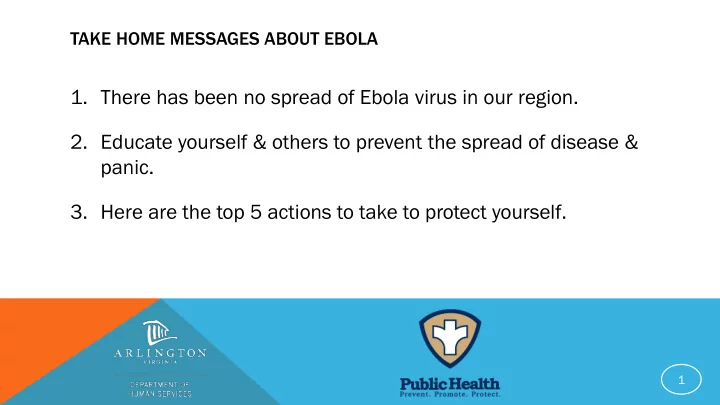

TAKE HOME MESSAGES ABOUT EBOLA 1. There has been no spread of Ebola virus in our region. 2. Educate yourself & others to prevent the spread of disease & panic. 3. Here are the top 5 actions to take to protect yourself. 1
THERE HAS BEEN NO SPREAD OF EBOLA VIRUS IN OUR REGION We recognize that Ebola is a scary disease. • • It is important to remember that the risk of Ebola spreading widely in the U.S. is low. Infection control when practiced correctly prevents Ebola • spread. 2
EDUCATE YOURSELF & OTHERS TO PREVENT THE SPREAD OF DISEASE & PANIC People with Ebola do not spread germs until • they have symptoms. • Ebola is spread through direct contact with blood & body fluids. • Ebola is NOT spread through breathing. • http://health.arlingtonva.us/public- health/educate-ebola 3
HERE ARE THE TOP 5 ACTIONS TO PROTECT YOURSELF • Wash your hands. Cover your coughs and sneezes. • • Get a flu shot. • Avoid contact with sick people. • Stay home when sick. 4
ENTEROVIRUS D68 • At more risk: infants, children & teens; those with asthma. Symptoms: cough, tiredness, & body aches; trouble breathing & wheezing. • Spreads through close contact: holding hands, sharing a snack, touching • infected surfaces, or being coughed/sneezed upon. • No treatment other than supportive care at home or the hospital. • Work with your child’s doctor to control your child’s asthma. • Avoid kissing, hugging, & sharing cups, forks, knives, & spoons. • Disinfect frequently touched surfaces. • Hand sanitizer does not work well against this germ. 5
INFLUENZA (FLU) • Spread by coughing, sneezing & close contact. • At greater risk: young children, people 65 & older, pregnant women & people with chronic medical conditions. • Symptoms: fever/chills, sore throat, muscle aches, fatigue, cough, headache, runny or stuffy nose. Complications: pneumonia & making existing medical conditions • worse; diarrhea & seizures in children. Every year thousands in the U.S. die from flu & many more are • hospitalized. • All people ages 6 months & older can receive the annual flu shot, with rare exceptions. 6
FLU VACCINE Recommended every year. • • Flu vaccine is the best protection against flu & its complications. • It also helps prevent spreading flu from person to person. • It takes 2 weeks for protection to develop & it lasts several months to a year. • Types of vaccine • Nasal spray: live, attenuated flu virus • Injectable: inactivated flu virus • Do not get the vaccine if you have severe, life-threatening allergies or had Guillain-Barre syndrome. If you are feeling sick, get the flu shot after you are feeling better. 7
Recommend
More recommend